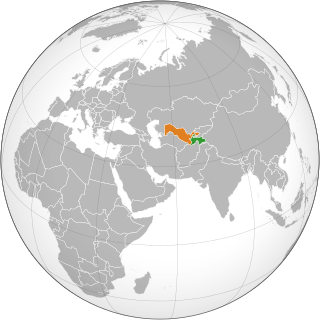Related Research Articles

Tajikistan, officially the Republic of Tajikistan, is a landlocked country in Central Asia. Dushanbe is the capital and most populous city. Tajikistan is bordered by Afghanistan to the south, Uzbekistan to the west, Kyrgyzstan to the north, and China to the east. It is separated from Pakistan by Afghanistan's Wakhan Corridor. It has a population of approximately 10.6 million people.
The politics of Tajikistan nominally takes place in a framework of a presidential republic, whereby the President is both head of state and head of government, and of a multi-party system. Legislative power is vested in both the executive branch and the two chambers of parliament.

Tajiks are a Persian-speaking Iranian ethnic group native to Central Asia, living primarily in Afghanistan, Tajikistan, and Uzbekistan. Tajiks are the largest ethnicity in Tajikistan, and the second-largest in Afghanistan and Uzbekistan. More Tajiks live in Afghanistan than Tajikistan. They speak varieties of Persian, a Western Iranian language. In Tajikistan, since the 1939 Soviet census, its small Pamiri and Yaghnobi ethnic groups are included as Tajiks. In China, the term is used to refer to its Pamiri ethnic groups, the Tajiks of Xinjiang, who speak the Eastern Iranian Pamiri languages. In Afghanistan, the Pamiris are counted as a separate ethnic group.

Dushanbe is the capital and largest city of Tajikistan. As of March 2024, Dushanbe had a population of 1,564,700, with this population being largely Tajik. Until 1929, the city was known in Russian as Dyushambe, and from 1929 to 1961 as Stalinabad, after Joseph Stalin. Dushanbe is located in the Gissar Valley, bounded by the Gissar Range in the north and east and the Babatag, Aktau, Rangontau and Karatau mountains in the south, and has an elevation of 750–930 m. The city is divided into four districts: Ismail Samani, Avicenna, Ferdowsi, and Shah Mansur.

Tajik, Tajik Persian, Tajiki Persian, also called Tajiki, is the variety of Persian spoken in Tajikistan and Uzbekistan by Tajiks. It is closely related to neighbouring Dari of Afghanistan with which it forms a continuum of mutually intelligible varieties of the Persian language. Several scholars consider Tajik as a dialectal variety of Persian rather than a language on its own. The popularity of this conception of Tajik as a variety of Persian was such that, during the period in which Tajik intellectuals were trying to establish Tajik as a language separate from Persian, prominent intellectual Sadriddin Ayni counterargued that Tajik was not a "bastardised dialect" of Persian. The issue of whether Tajik and Persian are to be considered two dialects of a single language or two discrete languages has political aspects to it.

Emomali Rahmon is a Tajik politician who has served as the President of Tajikistan since 1994, having previously led the country as Chairman of the Supreme Assembly from 1992 to 1994.

Vahdat is a city in western Tajikistan, on the bank of the Kofarnihon River, 21 km east of Dushanbe. It was previously called Yangi-Bozor (1927–1936), Orjonikidzeobod and Kofarnihon (1993–2006). Its population is estimated at 43,200 for the city proper and 342,700 for the city with the outlying communities (2020). Vahdat was the focus on international attention in 2019 when a riot occurred in the city's prison, believed to be instigated by members of Islamic State, which led to the deaths of three guards and 29 inmates.

Gorno-Badakhshan, officially the Badakhshan Mountainous Autonomous Region, is an autonomous region in eastern Tajikistan, in the Pamir Mountains. It makes up nearly forty-five percent of the country's land area but only two percent of its population.

Sunni Islam is, by far, the most widely practiced religion in Tajikistan. Sunni Islam of the Hanafi school is the recognized religious tradition of Tajikistan since 2009. According to a 2009 U.S. State Department release, the population of Tajikistan is 98% Muslim,, with some Sufi orders.

The Tajikistani Civil War, also known as the Tajik Civil War, began in May 1992 and ended in June 1997. Regional groups from the Garm and Gorno-Badakhshan regions of Tajikistan rose up against the newly formed government of President Rahmon Nabiyev, which was dominated by people from the Khujand and Kulob regions. The rebel groups were led by a combination of liberal democratic reformers and Islamists, who would later organize under the banner of the United Tajik Opposition. The government was supported by Russian military and border guards.

The Communist Party of Tajikistan is the oldest political party in Tajikistan. The party was founded on 6 December 1924 and was the ruling party of the Tajik Autonomous Soviet Socialist Republic from 1924 to 1929 and the Tajik Soviet Socialist Republic from 1929 to 1990 as part of the Soviet Union as a republican branch of the Communist Party of the Soviet Union. It was banned in 1991 following the 1991 coup.

The Islamic Renaissance Party of Tajikistan also known as the Islamic Revival Party of Tajikistan, is a banned Islamist political party in Tajikistan. Until 2015, when it was designated a terrorist organisation, it was the only legal Islamist party in Central Asia.
The United Nations Mission of Observers in Tajikistan (UNMOT) was a peacekeeping mission established by the United Nations Security Council in December 1994, and its mandate expired in May 2000. Its purpose was to monitor peace agreements during and after the Tajikistan Civil War. The observers were first deployed in the wake of the ceasefire, in 1994, between the ruling government of Tajikistan, led by Emomali Rahmonov, and the United Tajik Opposition. After the UN-sponsored armistice ended the war in 1997, the UN expanded the mission's original mandate to monitor the peace and demobilization. The mission was headquartered in Dushanbe, Tajikistan.

The Pamiris are an Eastern Iranian ethnic group, native to Central Asia, living primarily in Tajikistan (Gorno-Badakhshan), Afghanistan (Badakhshan), Pakistan (Gilgit-Baltistan) and China. They speak a variety of different languages, amongst which languages of the Eastern Iranian Pamir language group stand out. The languages of the Shughni-Rushani group, alongside Wakhi, are the most widely spoken Pamiri languages.

Tajikistan–Uzbekistan relations refers to the relations between the Republic of Tajikistan and the Republic of Uzbekistan.

The 1990 Dushanbe riots marked a period of heightened civil disobedience and inter-ethnic violence in the capital city of the Tajik SSR of the Soviet Union. Existing tensions over lacking economic and political reforms were exacerbated by the arrival of Armenian refugees from the Azerbaijan SSR due to the Nagorno-Karabakh conflict. The mass movement of Tajik nationalists, anti-communists, and Islamists targeted ethnic minorities, such as Armenians, Russians, Jews, as well as unaffiliated Tajiks—namely women who did not conform to Islamic clothing standards. By late 1991, the dissolution of the Soviet Union gave way to the Republic of Tajikistan declaring independence, though this was followed by the Tajikistani Civil War less than a year later.

Tajik–Turkish relations are friendly and cooperative and underlined with a legal basis of more than 30 treaties and protocols which have been signed between two countries since 1991.

United Nations Security Council resolution 968, adopted unanimously on 16 December 1994, after noting statements by the president of the security council and reports by the Secretary-General Boutros Boutros-Ghali on the situation in Tajikistan, the council established the United Nations Mission of Observers in Tajikistan (UNMOT) and addressed the process of national reconciliation in the country.

United Nations Security Council resolution 1061, adopted unanimously on 14 June 1996, after recalling all resolutions on the situation in Tajikistan and the Tajik-Afghan border, the Council extended the mandate of the United Nations Mission of Observers in Tajikistan (UNMOT) until 15 December 1996 and addressed efforts to end the conflict in the country.

Shirinsho Shotemur was a prominent Pamiri politician who made a major contributions to the early history of Soviet Tajikistan and was instrumental in the establishment of the Tajik Soviet Socialist Republic.
References
- ↑ "Tajikistan". www.worldstatesmen.org. Retrieved 2020-09-24.
- ↑ Dagiev, Dagiev (30 October 2013). Regime Transition in Central Asia : Stateness, Nationalism and Political Change in Tajikistan and Uzbekistan. Taylor and Francis. p. 213. ISBN 9781134600694 . Retrieved 19 December 2015.
- ↑ Abdullaev, Kamoludin; Akbarzaheh, Shahram (2010). Historical Dictionary of Tajikistan. Scarecrow Press. p. 269. ISBN 9780810873797 . Retrieved 19 December 2015.